- Home
- Georgette Heyer
An Infamous Army Page 7
An Infamous Army Read online
Page 7
Judith was satisfied. The Colonel, though ready to discuss the fête, had apparently forgotten Barbara Childe’s existence. Not one word of admiration for her crossed his lips; her name was not mentioned.
‘Julian, what a mercy! I don’t believe he can have liked her after all!’ confided her ladyship later, in the privacy of her own bedroom. ‘Indeed, I might have trusted to his excellent good sense. Did you notice that he did not once speak of her?’
‘I did,’ replied the Earl somewhat grimly.
‘Well?’
He looked at her, smiling, and took her chin in his hand. ‘You are an ever-constant source of delight to me, my love. Did you know?’ he said, kissing her.
Judith returned this embrace with great readiness, but asked: ‘Why? Have I said something silly?’
‘Very silly,’ Worth assured her tenderly.
‘How horrid you are! Tell me at once!’
‘My adorable simpleton, Charles induced no less a personage than the Prince of Orange to present him to the most striking woman in the room, seized not one but two waltzes which I have not the least doubt were bespoken days ago by less fortunate suitors, and comes away at the end of the evening with apparently not one word to say of a lady whom even you will admit to be of quite extraordinary beauty.’
‘Oh!’ she said. ‘Is that a bad sign, do you think?’
‘The worst!’ he answered.
She was shaken, but said stoutly: ‘Well, I don’t believe it. Charles has great good sense. I am perfectly at ease.’
Had she been privileged to observe Colonel Audley’s actions not very many hours later her faith in his good sense might have suffered a shock. The Colonel’s staff training had made him expert in obtaining desired information, and he had not wasted his time at the fête. While his sister-in-law still lay sleeping, he was up, and in the Earl’s stables. Seven o’clock saw him cantering gently down the Allée Verte, beyond the walls of the town, mounted on a blood mare reserved for his brother’s exclusive use.
Nor was this energy wasted. The edge had scarcely gone from the mare’s morning freshness before the Colonel was rewarded by the sight of a slim figure, in a habit of cerulean blue, cantering ahead of him, unattended by any groom, and mounted on a raking grey hunter.
The Colonel gave the mare her head, and in two minutes was abreast of the grey. Lady Barbara, hearing the flying hooves, had turned her head, and immediately urged the grey to a gallop. Down the deserted Allée raced the horses, between two rows of thick lime trees, and with the still waters of the canal shining on their left.
‘To the bridge!’ called Barbara.
The Colonel held the mare in a little. ‘Done! What will you wager?’
‘Anything you please!’ she said recklessly.
‘Too rash! I might take an unfair advantage!’
‘Pooh!’ she returned.
They flew on, side by side, until in the distance the bridge leading over the canal to the Laekon road came into sight. Then the Colonel relaxed his grip and allowed the Doll to lengthen her stride. For a moment or two the grey kept abreast, but the pace was too swift for her to hold. The mare pulled ahead, flashed on up the avenue, was checked just short of the bridge, and reached it, dancing on her hooves and snatching a little at the bit.
Barbara came up like a thunderbolt, and reined in, panting. ‘Oh, by God! Three lengths!’ she called out. ‘What do I lose?’
The Colonel leaned forward in the saddle to pat the Doll’s neck. Under the brim of his low-cocked hat his eyes laughed into Barbara’s. ‘I wish it might be your heart!’
‘My dear sir, don’t you know I haven’t one? Come now! In all seriousness?’
He looked at her thoughtfully. She had had the audacity to cram over her flaming curls a hat like an English officer’s forage cap. She wore it at a raffish angle, the leathern peak almost obscuring the vision of one merry eye. Her habit was severely plain, with no more than two rows of silver buttons adorning it, but the cravat round her throat was deeply edged with lace, its ends thrust through a buttonhole.
‘One of your gloves,’ said the Colonel, and held out his hand.
She pulled it off at once, and tossed it to him. He caught it, and tucked it into the breast of his coat.
She wheeled her mount, and prepared to retrace her steps. The Colonel fell in beside her at a walking pace.
‘Do you collect gloves, Colonel?’
‘I have not up till now,’ he replied. ‘But a glove is a satisfactory keepsake, you know. Something of the wearer always remains with it.’
‘Let me tell you that a gallant man would have let me win!’ she said, with a touch of raillery.
He turned his head. ‘Are you in general so spoilt?’
‘Of course! I’m Bab Childe!’ she replied, opening her eyes at him.
‘And challenged me to a race in the expectation of being permitted to win?’
Her mouth lifted a little at the corners; the one eye he could see glinted provocatively. ‘What do you think?’
‘I think you are too good a sportsman, Lady Barbara.’
‘Am I? I wonder?’ Her gaze flitted to the Doll; she said appreciatively: ‘I like a man to be a judge of horseflesh. What’s her breeding?’
‘I haven’t a notion,’ replied the Colonel. ‘To tell you the truth, she is out of my brother’s stable.’
‘I thought I knew her. But this is abominable! How was I to guess you would steal one of Worth’s horses? I consider you to have won almost by a trick! She’s the devil to go, isn’t she? Does he know you have her out?’
‘Not yet,’ admitted the Colonel. ‘My dependence is all on his being still too delighted at having me restored to him to object.’
She laughed. ‘You deserve to be thrown out of doors! I believe that to be the mare he habitually rides himself!’
‘Oh, it won’t come to that!’ said the Colonel. ‘I shall implore my sister-in-law’s intercession. That is a nice fellow you have there.’
She passed her hand over the grey’s neck. ‘Yes, this is Coup de Grâce. We are in the same case, only that while you stole your lady, I have been lent this gentleman.’
‘Whom does he belong to?’ asked the Colonel, running an eye over his points. ‘He may have a French name, but I’ll swear he’s of English breeding.’
‘Captain de Lavisse bought him in England last year,’ she replied with one of her sidelong looks.
‘Did he?’ said the Colonel. ‘Captain de Lavisse—is he the man who was standing beside you last night, when I first met you?’
‘I don’t recollect, but it is very probable. He is in the 5th National Militia: Count Bylandt’s brigade, stationed somewhere near Nivelles—Buzet, I think. He has estates north of Ghent, and a truly delightful house in the Rue d’Aremberg, here in Brussels.’
‘A gentleman of consequence evidently.’
‘Fabulously rich!’ said Barbara with an ecstatic sigh, and touching the grey’s flank with her heel, went ahead with a brisk trot.
He rode after; both horses broke into a canter, and their riders covered some distance under the limes without speaking. Barbara presently turned her head and asked bluntly: ‘Did you ride this way, and at this hour, to meet me?’
‘Yes, of course.’
She looked a little amused. ‘How did you know I rode here before breakfast?’
‘Something you said last night gave me the clue, and I discovered the rest.’
‘The deuce you did! I had thought very few people knew of this habit of mine. Don’t betray me, if you please. I don’t want an escort.’
‘Shall I go?’ enquired the Colonel with uplifted brows.
She reined in again to walk. ‘No. You have had the luck to encounter me in a charming mood, which is not a thing that happens every day of the week. I warn you, I have the most damnable temper, and it is generally at its worst before breakfast.’
‘Oh, that is capital!’ declared the Colonel. ‘You show me how I can be of real service
to you. I will engage to be here to quarrel with you any morning you may wish for a sparring partner.’
‘I think,’ she said quite seriously, ‘that you would not make a good sparring partner. You would spare me too much.’
‘Not I!’
She did not answer. A solitary horseman, cantering down the avenue towards them, had caught her attention. As he drew nearer, she turned to the Colonel with one of her wicked looks, and said: ‘You are about to meet the Captain Count de Lavisse. Shall you like that? He is quite charming!’
‘Then obviously I shall,’ he answered. ‘But I thought you said he was stationed at Nivelles?’
‘Oh, he has leave, I suppose!’ she said carelessly.
The Captain Count, very smart in a blue uniform with a scarlet-and-white collar, and a broad-topped shako, set at an angle on his handsome head, drew rein before them, and saluted with a flourish. ‘Well met, Bab! Your servant, mon Colonel!’
The Colonel just touched his hat in acknowledgment of this magnificent salute, but the lady blew a kiss from the tips of her fingers. ‘Let me make you known to each other,’ she offered.
The Count flung up a hand. ‘Unnecessary! We have met already, and there is between us an unpaid score. I accuse you of volerie, Colonel, and demand instant reparation!’
‘Your waltzes, were they?’ said the Colonel. ‘My sympathy is unbounded, believe me, but what can I do? The Duke is devilish down on duelling, or I should be happy to oblige. You will have to accept my profound apologies.’
‘This is dissimulation of the most base! I am assured that you would serve me again the same tour—if you could!’ said the Count gaily. His eyes rested for an instant on Barbara’s ungloved right hand. He made no comment, but there was a gleam of understanding in the glance he flashed at the Colonel. He wheeled his horse, and fell in beside Barbara. Across her, he addressed Colonel Audley: ‘Your first visit to Brussels?’
‘No; I was here last year for a short space. A delightful town, Count.’
The Count bowed. ‘A compliment indeed—from one who has known Vienna! Our endeavours must be united to preserve it from the Corsican maraudeur.’
‘Your endeavours may be,’ remarked Barbara, ‘but I have met some who wish quite otherwise.’
He stiffened. ‘Persons of no consequence, I assure you!’
‘By no means!’
‘Madame, when the time comes you shall see how the suspected Belgians shall comport themselves!’ He threw a somewhat darkling look at Colonel Audley, and added: ‘Rest assured, we are aware what malveillants reports have been spread of us in England, and by whom! Is it not so, mon Colonel? Have you not been warned that our sympathies are with Bonaparte, that we are, in effect, indignes de confiance?’
The Colonel responded with easy tact, but lost no time in turning the conversation into less dangerous channels. A civil interchange was maintained throughout the remainder of the ride, but the Lady Barbara, suddenly capricious, was silent. Only when they arrived at Vidal’s house in the Rue Ducale did she seem to recover from her mood of abstraction. She gave the Colonel her hand then, and the shadow of a tantalising smile. ‘Do you really care to quarrel with me, Colonel?’
‘Above all things!’
‘You have not met my brother and his wife, I think? They are holding a soirée here tomorrow evening. It will be confoundedly boring, but come!’
‘Thank you: I shall not fail.’
A few minutes later, Barbara dropped into a chair at her brother’s breakfast table, and tossed her forage cap on to another. Vidal said peevishly: ‘I suppose you have been making yourself remarkable. If you choose to ride out before breakfast, you may for all I care, but I wish you will not go unescorted!’
‘No such thing! I was escorted—I was doubly escorted! Tell me all you know of Charles Audley, Robert.’
‘I don’t know anything of him. How should I?’
‘A younger son, with no prospects,’ said Augusta trenchantly.
‘But with such charm of manner, Gussie!’
‘I daresay.’
‘And such delightful smiling eyes!’
‘Good God, Bab, what is all this?’
‘Oh, I have had the most enchanting morning!’ Barbara sighed. ‘They rode on either side of me, Etienne and this new suitor of mine, and how they disliked one another! I have invited Charles Audley to your party, by the way.’
‘Oh, very well! But what is the matter with you? What is there in all this to put you in such spirits?’
‘I have lost my heart—to a younger son!’
‘Now you are being absurd. You will be tired of him in a week,’ said Augusta with a shrug.
Five
From the Rue Ducale, with its houses facing the Park and backing on to the ramparts of the town, to Worth’s residence off the Rue de Bellevue, was not far. Colonel Audley arrived in good time for breakfast, laughing off his sister-in-law’s demand to know what could have possessed him to ride out so early after a late night, listened meekly to some pithy comments from his brother on his appropriation of the Doll, swallowed his breakfast, and made off on foot to the Duke of Wellington’s Headquarters in the Rue Royale. This broad street lay on the opposite side of the Park to the Rue Ducale, its houses overlooking it. Two of these made up the British Headquarters, but the guard posted outside consisted merely of Belgian gendarmerie, the Duke, whose tact in handling foreigners rarely deserted him, having professed himself perfectly satisfied with such an arrangement.
The Duke, when Colonel Audley arrived, was closeted with the Prince of Orange, who had brought with him a welter of reports, letters for his Grace from Lord Bathurst, the English Secretary for War, and his own instructions from the British Commander-in-Chief, his Royal Highness the Duke of York. Colonel Audley, learning of this circumstance from Lord March, whom he met in the hall, ran upstairs to a large apartment on the first floor overlooking the Park, where he found two of his fellow aides-de-camp, in curiously informal attire, kicking their heels.
A stranger, unaware of the Duke of Wellington’s indifference to the manner in which his officers chose to dress themselves, might have found it difficult that either of the two gentlemen in the outer office could be an aide-de-camp on duty. Fremantle, lounging in a chair with his legs thrust out before him, was certainly wearing a frock-coat, but had no sash; while Colonel the Honourable Sir Alexander Gordon, who was seated in the window, engaged in waving to acquaintances passing in the street below, was frankly civilian in appearance, his frock-coat being (he said) quite unfit for further service.
Fremantle was looking harassed, but Gordon’s sunny temper seemed to be unimpaired.
‘In the immortal words of our colleague, Colin Campbell,’ he was saying, as Colonel Audley strolled in, ‘“Je voudrais si je coudrais mais je ne cannais pas!’’’
‘Don’t be so damned cheerful!’ begged Fremantle. His jaundiced eye alighted on Colonel Audley’s immaculate staff dress. ‘Lord, aren’t we military this morning!’ he remarked. ‘That ought to please the Beau: we have had one snap already about officers presenting themselves for duty in improper dress.’
‘Oh!’ said Audley. ‘Crusty, is he?’
‘Yes, and he’ll be worse by the time he’s done with all Slender Billy’s lists and requisitions and morning states,’ replied Fremantle, with a jerk of his head towards the door leading to the Duke’s office.
Gordon, who was looking down into the street, announced: ‘Here comes old Lowe. I wonder whether he’s realised yet that the Duke doesn’t like being told how he ought to equip his army? Someone ought to drop him a hint.’
‘Fidgety old fool!’ said Fremantle. ‘There’ll be an explosion if he cites the Prussians to the Beau again. I’m glad I’m not going to Ghent.’
‘Ghent? Who is going to Ghent?’ asked Audley.
‘You are, my boy,’ replied Fremantle comfortably.
‘When?’
‘Tonight or tomorrow. Don’t know for certain. The news is that Harro
wby and Torrens are arriving from London today for a conference with the Duke. He is going with them to Ghent, to pay his respects to the French king.’
‘Damnation!’ exclaimed Audley. ‘Why the devil must it be me?’
‘Ask his lordship. Daresay he noticed your fine new dress uniform last night. He must know mine ain’t fit to be taken into Court circles. Why shouldn’t you want to go to Ghent, anyway? Very nice place, so I’m told.’
‘He’s got an assignation with the Fatal Widow!’ said Gordon. ‘That’s why he’s so beautifully dressed! New boots too. And just look at our elegant sash!’
Colonel Audley was saved from further ribaldry by the sudden opening of the door into the inner sanctum. The Duke came out, escorting the Prince of Orange. He did not, at first glance, appear to be out of humour, nor did the Prince bear the pallid look of one who had had the ill-luck to find his Grace in a bad temper.
However, when the Duke returned from seeing his youthful visitor off, there was a frosty look in his eye, and no trace of the joviality which had surprised Lady Worth at the Hôtel de Ville. He had, at the fête, given everyone to understand that he was entirely carefree, and perfectly satisfied with all the preparations for war which had been made.
But the Duke at a ball and the Duke in his office were two very different persons. Lord Bathurst, in London, had been quite anxious to see him at the head of the Army as any in Brussels, but Lord Bathurst was shortly going to be made to realise that his Grace’s arrival in Belgium was not to be a matter of unmixed joy for officials at home.
For the Duke was not in the least satisfied with the preparations he found, and did not hesitate to inform Lord Bathurst that he considered the Army to be in a bad way. He had received disquieting accounts of the Belgian troops, thought the English not what they ought to be, and expressed a wish to have forty thousand good British infantry sent him, with not less than a hundred and fifty pieces of field artillery, fully horsed. It did not appear to his Grace that a clear view of the situation was being taken in England. ‘You have not called out the militia, or announced such an intention in your message to Parliament,’ he complained. ‘ . . . and how we are to make out 150,000 men, or even the 60,000 of the defensive part of the treaty of Chaumont, appears not to have been considered.’ His boldly-flowing pen travelled on faster. He wanted, besides good British infantry, spring wagons, musketball cartridge carts, entrenching-tool carts, the whole Corps of Sappers and Miners, all the Staff Corps, and forty pontoons, immediately, fully horsed. ‘Without these equipments,’ he concluded bluntly, ‘military operations are out of the question.’

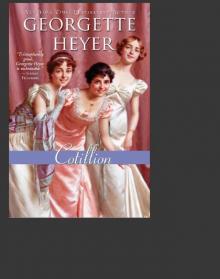 Cotillion
Cotillion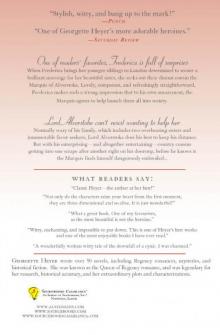 Frederica
Frederica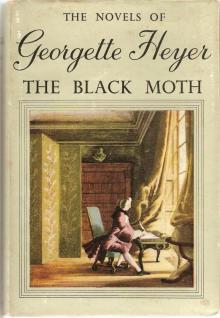 The Black Moth: A Romance of the XVIIIth Century
The Black Moth: A Romance of the XVIIIth Century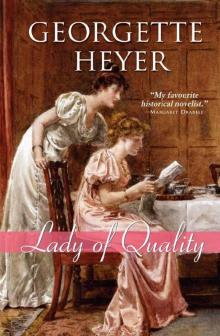 Lady of Quality
Lady of Quality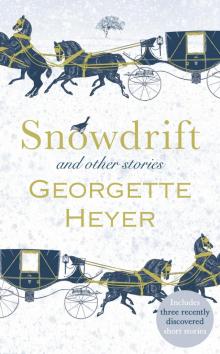 Snowdrift and Other Stories
Snowdrift and Other Stories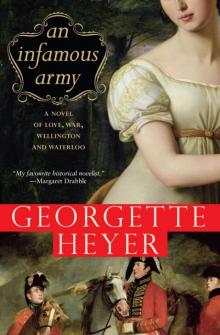 An Infamous Army
An Infamous Army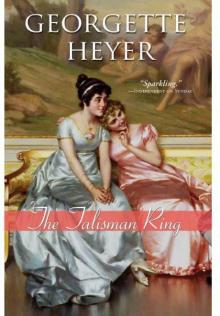 The Talisman Ring
The Talisman Ring Venetia
Venetia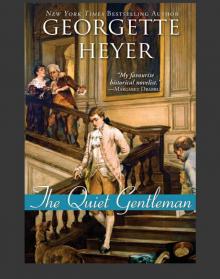 The Quiet Gentleman
The Quiet Gentleman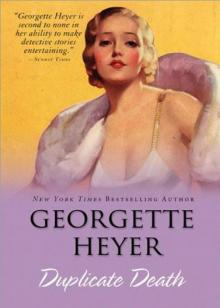 Duplicate Death
Duplicate Death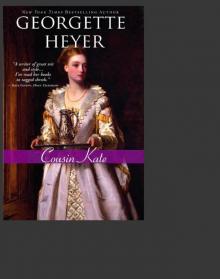 Cousin Kate
Cousin Kate Black Sheep
Black Sheep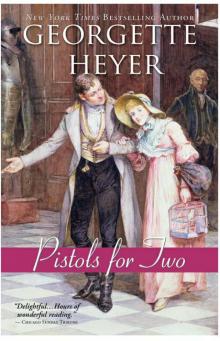 Pistols for Two
Pistols for Two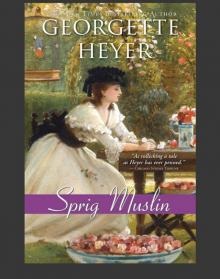 Sprig Muslin
Sprig Muslin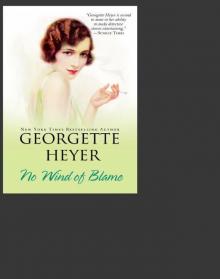 No Wind of Blame
No Wind of Blame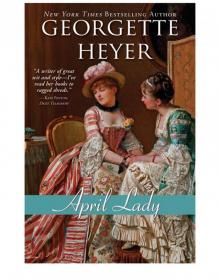 April Lady
April Lady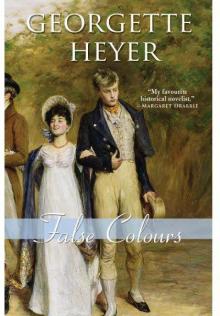 False Colours
False Colours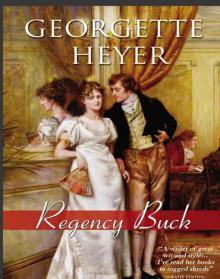 Regency Buck
Regency Buck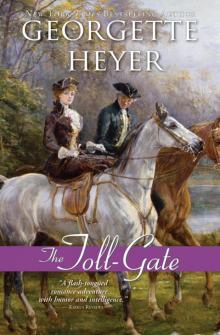 The Toll-Gate
The Toll-Gate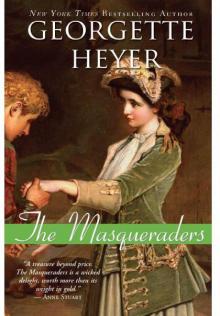 The Masqueraders
The Masqueraders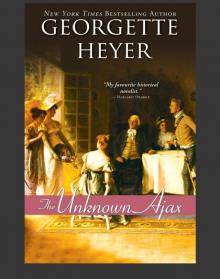 The Unknown Ajax
The Unknown Ajax The Grand Sophy
The Grand Sophy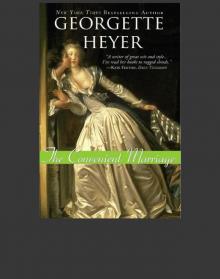 The Convenient Marriage
The Convenient Marriage Faro's Daughter
Faro's Daughter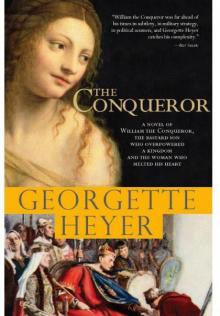 The Conqueror
The Conqueror The Foundling
The Foundling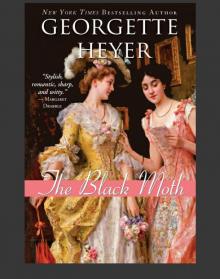 The Black Moth
The Black Moth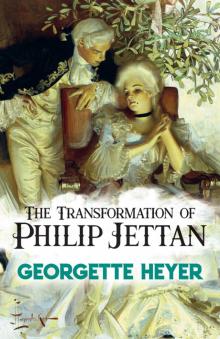 The Transformation of Philip Jettan
The Transformation of Philip Jettan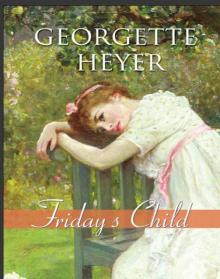 Friday's Child
Friday's Child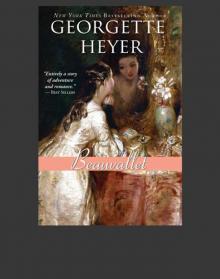 Beauvallet
Beauvallet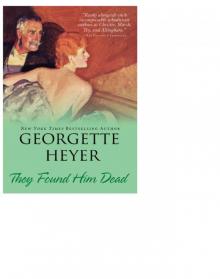 They Found Him Dead
They Found Him Dead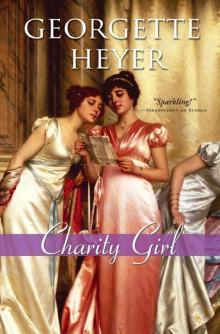 Charity Girl
Charity Girl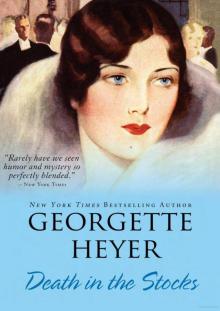 Death in the Stocks: Merely Murder
Death in the Stocks: Merely Murder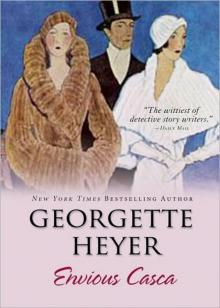 Envious Casca
Envious Casca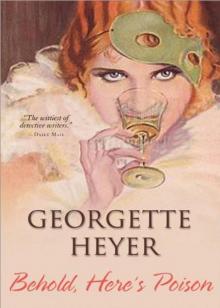 Behold, Here's Poison
Behold, Here's Poison Arabella
Arabella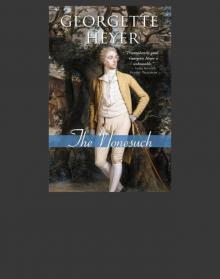 The Nonesuch
The Nonesuch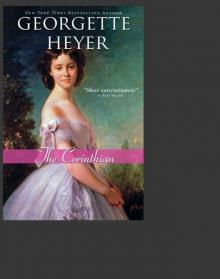 The Corinthian
The Corinthian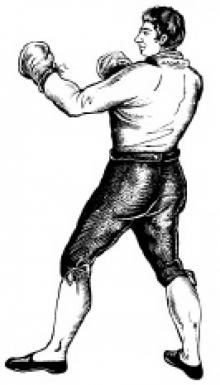 Jennifer Kloester
Jennifer Kloester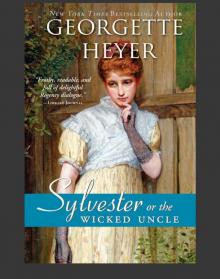 Sylvester
Sylvester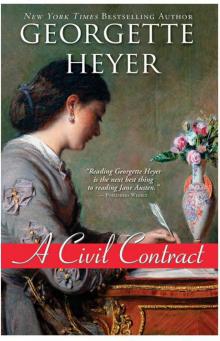 A Civil Contract
A Civil Contract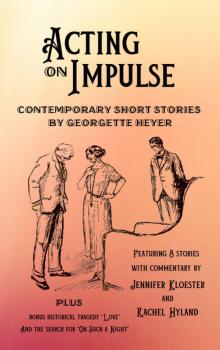 Acting on Impulse
Acting on Impulse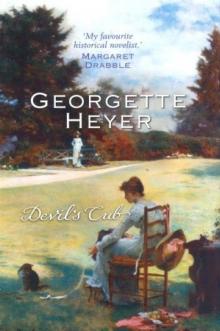 Devil’s Cub at-2
Devil’s Cub at-2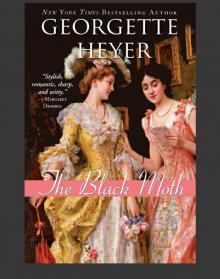 Black Moth
Black Moth Grand Sophy
Grand Sophy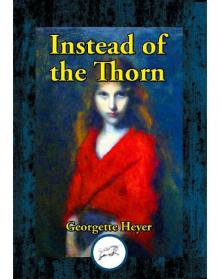 Instead of the Thorn
Instead of the Thorn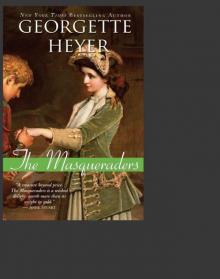 Masqueraders
Masqueraders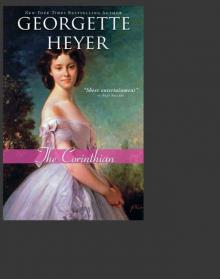 Corinthian
Corinthian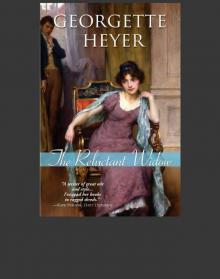 Reluctant Widow
Reluctant Widow